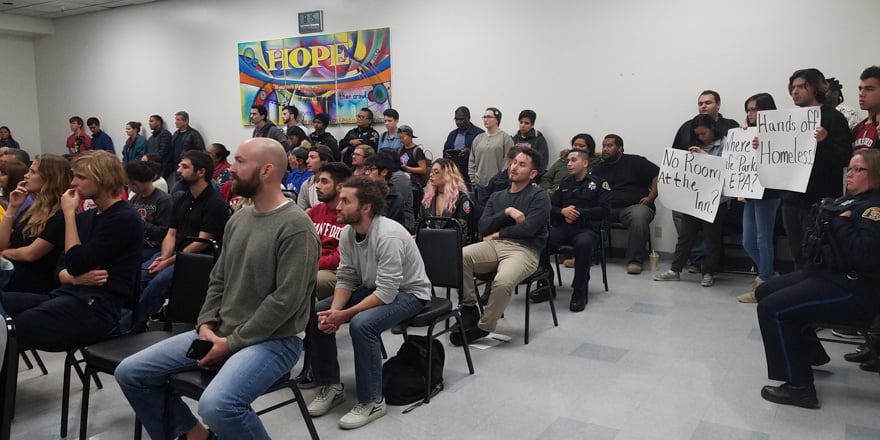Dozens of Stanford students spoke out in support of residents living in RVs in East Palo Alto at a meeting of the East Palo Alto Public Works and Transportation Commission Wednesday night, where the commission discussed a possible parking ordinance that would prohibit overnight parking of oversize vehicles in the city.
Protesters and some residents who spoke at the meeting said the proposed ordinance is an affront to working class residents, including families and people of color, who are being pushed out of traditional housing by rising Bay Area housing prices. According to the San Jose Mercury News, homelessness in East Palo Alto’s Ravenswood City School District has more than doubled from 25 percent at the start of last school year to 58 percent.
“I have a hard enough time making ends meet on a graduate stipend,” said Vivian Yan, a graduate student who attended but did not speak at the meeting. “As a Stanford student, the least that I can do is try to support folks that don’t have the subsidized housing that Stanford tries to provide.”
The meeting came after city officials told Weeks St. RV residents Tuesday afternoon that they had to move their vehicles by 8 a.m. Wednesday or else risk being towed. Officials cited the public safety hazards created by RV residents dumping chemical toilets into storm drains on the flood-prone street as the reason for removal.
RV residents at the meeting said that they currently dump their chemical toilets in Redwood City for a fee of $25. Some suggested that the city provide free waste management or portable toilets to address the problem.
Stanford students who spoke at the meeting expressed solidarity with those living in RVs, condemned the proposed ordinance and publicly endorsed activists’ efforts moving forward.
Doris Rodriguez ’20 related the current situation in East Palo Alto to her childhood experience of living in an RV in Miami, noting the difficult choice her father had to make between feeding his daughter and paying a fee to dump their RV’s chemical toilet.
“I’m at Stanford because of people who had compassion,” Rodriguez said. “You’re blaming the wrong people.”
Chris Phan ’19, who is leading an Alternative Spring Break on housing inequality in the Bay Area this year, said that attending the protest gave her an opportunity to “do more than just teaching and talking about [housing rights].”
But not everyone in attendance agreed with the Stanford protesters.
Some East Palo Alto residents supported the ordinance, saying that allowing RV parking makes the streets unclean, unsafe and unwelcoming. Many suggested that the city create or support alternative options, such as designating certain city-owned lots for RV parking or working with local nonprofits and faith-based groups to determine a solution.
Some residents also expressed frustration that comments from Stanford students took up a significant portion of the public meeting and wondered aloud when the next EPA resident would be called to speak.
Others said the students in attendance should focus their attention toward securing resources from Stanford to help struggling neighboring areas like East Palo Alto.
“Get Stanford to allocate land for the people who have been working for them for centuries,” said Meda Okelo M.A. ’84, an East Palo Alto resident.
After hearing public comment, the commission recommended that the City Council immediately pursue possible connections with nonprofits and faith-based community groups that have offered to provide permanent or temporary places for RV residents to park.
The commission plans to further discuss the proposed ordinance at two separate special meetings, one addressing RV parking and another addressing commercial vehicle parking. Their recommendations will be brought to the City Council before the end of the 60-day parking prohibition on Weeks St.
This post has been updated. A previous version misspelled Vivian Yan’s name as Vivian Yang. The Daily regrets this error.
Contact Zoe Sayler at zoeneile ‘at’ stanford.edu.
